Results,
table and transfers 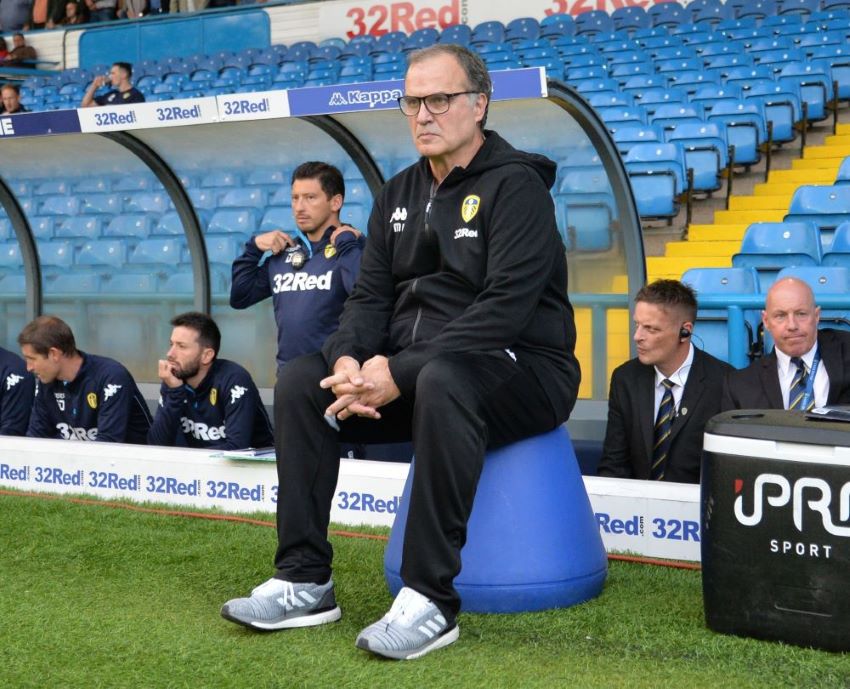
In the old days, when Leeds United were one of the most respected clubs
in Europe, they were led by some of the game's finest managers … Don Revie,
Brian Clough, Jock Stein, Howard Wilkinson, George Graham, Terry Venables.
It was years since United had gone hunting in a pool of such big fish.
Shaken by his failed experiments with unknown quantities, Andrea Radrizzani
was determined to get a man who could make Leeds United tick when he set
out to replace Paul Heckingbottom in the summer of 2018.
There were some big names on the Italians' list of possibles, but the
man at the top of the list was less well-known to the run-of-the-mill
football fan. Some of the world's most eminent coaches, though, certainly
rated Marcelo Bielsa, a 62-year-old Argentine who had led both Argentina
and Chile in World Cup tournaments. Pep Guardiola, Mauricio Pochettino
and Diego Simeone all freely acknowledged the debt they owed to Bielsa
and how highly they rated him.
He had achieved extraordinary things with boyhood favourites Newell's
Old Boys, Velez Sarsfield and Athletic Bilbao before less successful periods
with Olympique Marseille, Lazio and Lille.
The episode with Lille ended in acrimony with Bielsa sacked after a dispute
over transfers and the direction of the club. The matter had been subject
to a legal case with Bielsa suing for €19m in damages.
Victor Orta never thought Leeds would have a chance of capturing Bielsa
when Radrizzani asked whom he considered the best man to take on his project
but put forward his name regardless. When Radrizzani gave the nod, Orta
set the wheels in motion.
It was not a question of persuading one of the globe's most revered coaches
to take up the reins at Elland Road, it was all about allowing Bielsa
to decide for himself that the revival of Leeds United, the archetypal
sleeping giants, was a project worthy of his attention.
Bielsa quickly satisfied himself that this was indeed such a project,
an emotion-soaked challenge that appealed to the instincts that had so
endeared Newell's to him.
Bielsa was no ordinary coach and Leeds United was no ordinary club. Its
name had been dragged through the mud, its history rubbished, its status
dismissed as a thing of the past, but undoubtedly it was still a remarkable
club, supported by remarkable fans and now owned by a remarkable man in
Radrizzani. Bielsa would not manage just any old club, he had to be certain
it was one with which he could empathise, in a city that he could identify
with and which would fall in love with him.
And certainly, the people of Leeds fell in love with Bielsa in a way
that they had not done with anyone since Don Revie. Howard Wilkinson came
close when he captured the Second Division title and the league championship
within two years of each other, but he lost his way and the love of the
fans badly enough to be discarded four years later.
After weeks of courtship, Radrizzani got his man on 15 June, persuading
Bielsa to sign a two-year contract with an option of a third. It cost
a fortune with Bielsa becoming United's best paid manager ever at £6m,
twice the cost of any other Championship coach and half a million more
than the Football Association paid Gareth Southgate.
back to top
'It has always been my ambition to work in England,' said Bielsa. 'I
have had several opportunities to do so during my career, however 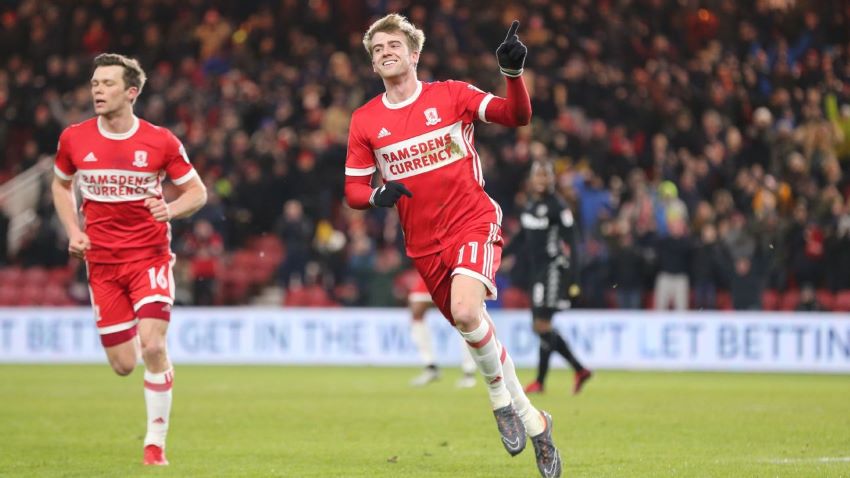 I
have always felt it was important to wait for the right project to come
along … when a club with Leeds United's history made me an offer, it was
impossible to turn down.'
I
have always felt it was important to wait for the right project to come
along … when a club with Leeds United's history made me an offer, it was
impossible to turn down.'
'He is a coach that I have admired for many years,' said Radrizzani.
'When the opportunity arose to bring him to Elland Road, we made it our
top priority for the summer … Marcelo has a wealth of experience and he
will use that to create a new culture and a winning mentality at our football
club.'
Angus Kinnear revealed that Bielsa's stated intention was to get the
best out of the players already at Elland Road rather than bring in a
mass of new recruits. He cited Liam Cooper and Kalvin Phillips as men
whom Bielsa intended to develop into 'the best in the division'.
Leeds laid out £3m to secure Wolves left-back Barry Douglas but Patrick
Bamford of Middlesbrough was the marquee signing, his transfer fee set
at an initial £7m with the scope to climb to £10m. It was the club's most
expensive transfer since the purchase of Robbie Fowler in 2001. Bamford
had put himself slam bang into the centre of United's vision with his
hat trick when Middlesbrough beat Heckingbottom's side in March.
Orta's insight into workings at the Riverside helped considerably and
Bielsa was quickly sold on Bamford's benefits. He was perfect for the
game that Bielsa wanted to play, someone who could fill the role of lone
front runner in addition to scoring goals.
Bielsa was steadfast about his commitment to a small, tight squad. 12
members of the first-team and development squads departed permanently
while another 20 were lent out. The greatest anguish came with fans' favourite
Ronaldo Vieira sold to Sampdoria to help Leeds cope with the rules of
Financial Fair Play.
It was an extraordinary cull, Bielsa clear that he did not want to have
players with little chance of playing hanging around Elland Road. He was
happy to rely on Academy players in the event of injury, a sharp break
from previous practice.
Four players, three of them from Chelsea, were brought in on loan to
add some depth, but only Manchester City wide man Jack Harrison had any
genuine impact.
Pre-season was hard going, with Bielsa and his coaching team driving
the players hard, intent on bringing them to peak fitness. The term 'Murderball'
became a staple element of the Bielsa myth.
Mateusz Klich, the Polish midfielder who returned from loan to become
a mainstay of Bielsa's United, gave some insight into the legendary training
drill.
'It's basically playing 11 v 11 with no stops … Constantly running around
and sprinting, and you have all the coaches on the pitch screaming all
the time and you can't stop running. It's just a normal game with normal
rules … You just play, but you can't stop running. It's tough, but it's
the most important session in the week. It depends on the training how
long he wants us to play. It could be five times six minutes, or one times
20 minutes. It just depends what Marcelo wants. Even if the ball goes
out, there's a member of staff waiting with another ball to put it in.
You can't stop.'
Certainly, by the time that the new season came around, the players'
fitness was transformed. They were lean, mean and ready to run until they
dropped.
Bielsa sprang several surprises on the opening day, although the adoption
of a 4-1-4-1 formation was not one of them.
There were notable absentees from the starting XI in the shape of Chelsea
loanee keeper Jamal Blackman, Pontus Jansson, Harrison and 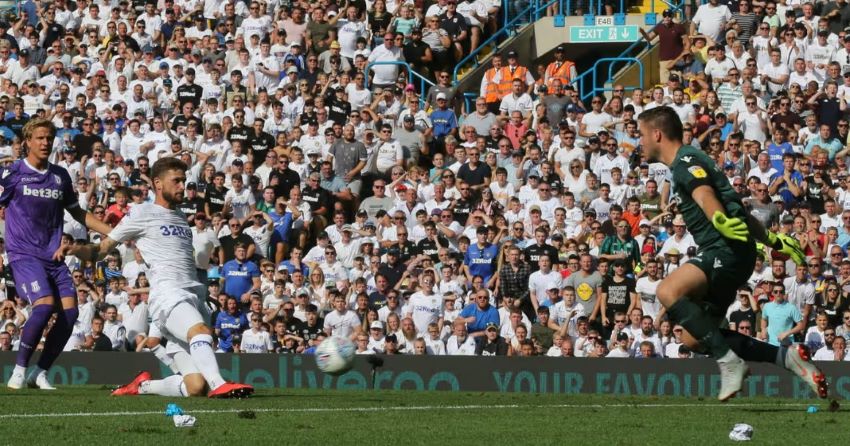 Bamford.
Bamford.
The most significant omission was Jansson, who had been allowed an extended
absence following Sweden's participation in the World Cup finals. One
of Bielsa's foibles was a refusal to select anyone whom he felt was not
yet acclimatised to his regime. Jansson would not be the last player to
experience the feeling.
Another surprise was the inclusion of Klich, whose Leeds career had appeared
stillborn after Christiansen despatched him on loan the previous season.
The absence through injury of Adam Forshaw and the sale of Vieira gave
the Pole an early opportunity to prove he still had something to bring
to the party.
Bielsa persisted with 21-year-old Bailey Peacock-Farrell in goal, despite
expectations that Blackman would be first choice. Heckingbottom had turned
to Peacock-Farrell after the failure of both Wiedwald and Lonergan. He
had seized the opportunity well enough to earn a first cap for Northern
Ireland in May.
Douglas was the only new man in the starting 11 with Gaetano Berardi
taking Jansson's place and Luke Ayling and Liam Cooper completing the
back four.
back to top
Bielsa employed Kalvin Phillips as a holding midfielder, occasionally
being withdrawn to make it three centre-backs — it was evident that
the manager had worked closely with Phillips during the summer. The player
was not entirely comfortable when Bielsa revealed his plans — Phillips
as quarterback, capitalising on his ability to read the game and set moves
in motion with long, raking passes.
Pablo Hernandez was used wide right in front of Klich with Samu Saiz
filling the No 10 role. Gjanni Alioski was asked to drive up and down
the left flank and Kemar Roofe led the line.
Leeds kicked the season off against relegated Stoke City, a team strongly
fancied to go back up at the first attempt. Many thought United would
struggle to contain them, even more so when they saw Bielsa's selection.
They should have known better. Bielsa hit the ground running and won
3-1, looking back not once after Klich opened the scoring in the 15th
minute.
'I've never seen Leeds play like this,' said one overjoyed spectator,
echoing the views of many of the happy faces around him.
The next game was even better, an extraordinary 4-1 victory at Derby
County. Klich again set the ball rolling after five minutes and Roofe
showed the Bielsa Effect, playing better than he ever had and scoring
two breathtaking goals.
A year earlier, Christiansen had flattered to deceive, but Bielsa looked
like a genuine Messiah in waiting. Bielsa's impact was extraordinary,
coaxing wonderful performances from a squad that the previous year had
looked distinctly average.
Rotherham were easy meat and Leeds squeezed a point out of Swansea before
another superb display, away to Norwich. Klich's third goal of the season
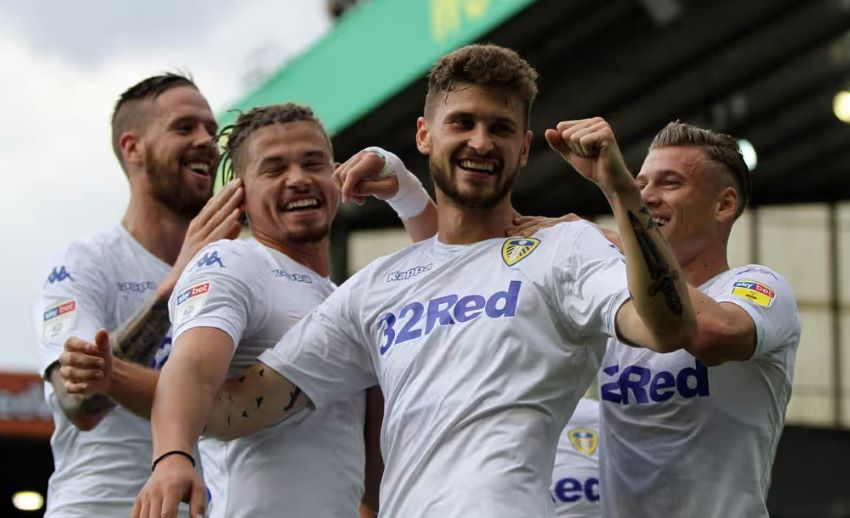 got
the show on the road again and Leeds blossomed in the sunshine, making
the Canaries look inept in a 3-0 hammering that was over long before Hernandez
wrapped things up with the third goal after 67 minutes.
got
the show on the road again and Leeds blossomed in the sunshine, making
the Canaries look inept in a 3-0 hammering that was over long before Hernandez
wrapped things up with the third goal after 67 minutes.
The influence of the Spanish playmaker had quickly become evident to
Bielsa.
'It's obvious that Hernandez has been very important to our team,' said
the Argentine. 'He is the player who has the best regularity and he's
the player with the biggest influence in the control of the games. He's
a very intelligent player.'
Asked to expand on the importance of the Spaniard, Bielsa commented,
'I think he can make me a better head coach because I see solutions he
is finding and decisions he is taking, that I only saw a very few times
during my career.'
Some had expressed serious doubts about Bielsa, that he was a spent force
with his best years behind him. They counselled that he would struggle
to cope with the prosaic demands of Championship football, but they could
not have been more wrong.
Unwilling to compromise, he imposed his commitment to attacking football
and the intense press. He set the agenda rather than responding to it.
'We play football as she is meant to be played.'
After a delightful unbeaten opening run of eight games with four clean
sheets, Leeds looked like they would coast to promotion. The fans glowed
with excitement, but their confidence was shaken by three defeats in the
nine fixtures that followed.
The last of those, by 4-1 at promotion rivals West Bromwich Albion on
10 November, appeared critical, as Leeds relinquished the leadership of
the division to Norwich. Normal order was restored with a lengthy winning
streak.
Two days before Christmas at Aston Villa, Leeds fell two goals behind
after seventeen minutes. It looked like the run was done, but 18-year-old
winger Jack Clarke came off the bench at half-time to inspire a blistering
comeback. Eleven minutes in and Clarke came flying off the left flank
to jink past several defenders before firing home. Five minutes later
Jansson powered home a towering header to make it 2-2.
It appeared that would be it, a decent point, but Roofe fired home the
winner in the fifth minute of stoppage time to spark incredible scenes.
It was even tighter in the next game, on Boxing Day against Blackburn.
Everything seemed to be going to plan when Leeds took the lead after 33
minutes, but Rovers equalised two minutes into the second half. When Charlie
Mulgrew gave them a lead at the death, things looked desperate, but Roofe
scored twice in injury-time to secure another breathtaking 3-2 victory.
United's momentum was halted by two defeats over the following six days
as Leeds demonstrated their vulnerabilities. They retained top spot, but
Norwich, 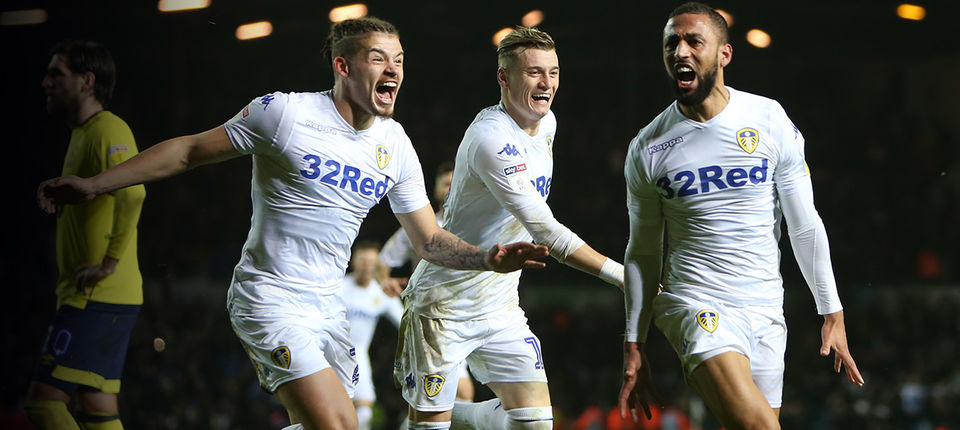 Sheffield
United and West Bromwich Albion were closing fast. Exit from the FA Cup
at QPR was irrelevant given the second string nature of Bielsa's selection
but a chance to restore some confidence was lost.
Sheffield
United and West Bromwich Albion were closing fast. Exit from the FA Cup
at QPR was irrelevant given the second string nature of Bielsa's selection
but a chance to restore some confidence was lost.
back to top
Faith in Bielsa's leadership remained strong but United had snatched
defeat from the jaws of victory on too many occasions in the past to take
anything for granted — supporters refused to put any stock in the
noise about teams on top at Christmas always securing promotion.
As Leeds prepared for their home game with Derby on 11 January, Bielsa
despatched a member of staff to covertly observe the Rams' training session.
When he was spotted and reported to the police, there was a huge furore
about the ethics of the matter and a self-righteous Frank Lampard accused
Bielsa of a lack of sportsmanship. There was a flurry of support for Lampard
with media pundits pillorying Bielsa. 'Spygate' was a storm in a teacup,
though the noise dragged on for months, with a number of Leeds' Championship
rivals demanding an inquiry.
As luck would have it, Sky Sports was covering the game on a freezing
Friday night. Anchorman Scott Minto described what it was like as the
tension ramped up.
'The whole running order of the show was ripped up. We had done all our
prep in the days before and then travelled to Leeds, and then this massive
story breaks. We arrived at the ground and it all felt very different.
It is a rare thing to get big, breaking news like that on the day of a
game, so it was all so fresh and exciting to cover. To give credit to
Bielsa, he wanted to come out and talk, and it added a huge element of
importance to the show.'
Bielsa fronted up and admitted that he had indeed sent someone to spy
on Derby's training session, adding that it was something he had always
practiced.
'I would have thought it would have impacted more negatively upon Leeds
as they were the ones being called unsportsmanlike,' added Minto, 'but
it seemed to have more of an effect on Derby. Leeds, meanwhile, seemed
to rise to it … It was one of their best displays of the season, and probably
one of Derby's worst. It was quite surprising.'
Leeds won 2-0 to maintain their promotion push, but the club was fined
£200,000 by the EFL for the incident.
Leeds announced that Bielsa would hold an impromptu press conference
later in the week, prompting some to speculate that he was going to walk
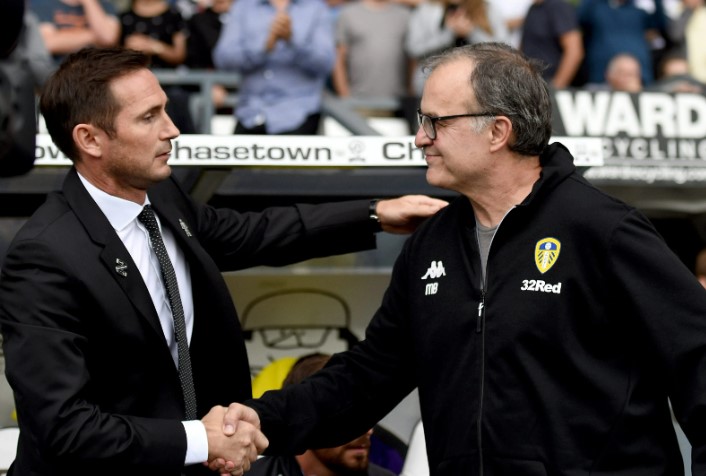 away
from the club. Not a bit of it, as the Argentine delivered an elaborate
presentation to demonstrate that surveillance was merely the cherry on
the cake of the vast preparation that he lavished on every game.
away
from the club. Not a bit of it, as the Argentine delivered an elaborate
presentation to demonstrate that surveillance was merely the cherry on
the cake of the vast preparation that he lavished on every game.
Bielsa settled the fine himself, saying, 'The sanction [the EFL] gave
us of £200,000 — it is a financial sanction against the club, not
against me, but I am responsible for it. That is why I paid it from my
pocket, the financial sanction.'
In a trice, Bielsa had defused all the criticism and emerged with even
more support than he previously enjoyed.
Klich played up to the controversy at the final whistle against Derby,
putting both hands to his eyes in a 'binocular' gesture. Leeds fans loved
it on Twitter and devised Stop Crying Frank Lampard, a mickey-take
of the Oasis song Stop Crying Your Heart Out.
If Leeds laughed things off at the time, they were soon less happy, stumbling
through the weeks that followed, losing at Stoke, winning narrowly at
struggling Rotherham and losing at home to Norwich. The Canaries took
top spot on goal difference as Sheffield United closed to within three
points after thirty games.
The promotion battle between the three joined in earnest, with two automatic
slots on offer.
After 15 Championship starts for him, the manager decided that Samu Saiz
was not a Bielsa man, sending him off on loan to Getafe in Spain on New
Year's Day. The fans implored Bielsa to strengthen in the window, but
all they got was a goalkeeper to replace Blackman, who had returned to
parent club Chelsea after breaking his tibia.
That said, the goalkeeper was a big name. Kiko Casilla had won three
Champions League medals with Real Madrid and United made him the highest
paid player at Elland Road.
back to top
It was not that Leeds hadn't pursued others. Victor Orta nearly signed
Daniel James, the Swansea winger, but the Swans went cold on the deal
in the closing hours of the window to leave both Orta and James beside
themselves with dismay.
Leeds regained their form in February and gave a wonderful display on
1 March to hammer West Brom 4-0 at Elland Road. The victory allowed them
to leapfrog Norwich and Sheffield United to regain top spot, though the
Canaries won at Millwall the next day to regain their ascendancy.
United won their next two games at Bristol City and Reading without conceding
but Norwich and the Blades stubbornly dogged their steps.
And next up were Sheffield United at Elland Road. Victory would give
Leeds a five-point cushion over the visitors.
Unfortunately, the Whites couldn't make home advantage count and Sheffield
inflicted a mortal wound, scoring the only goal of the game after 71 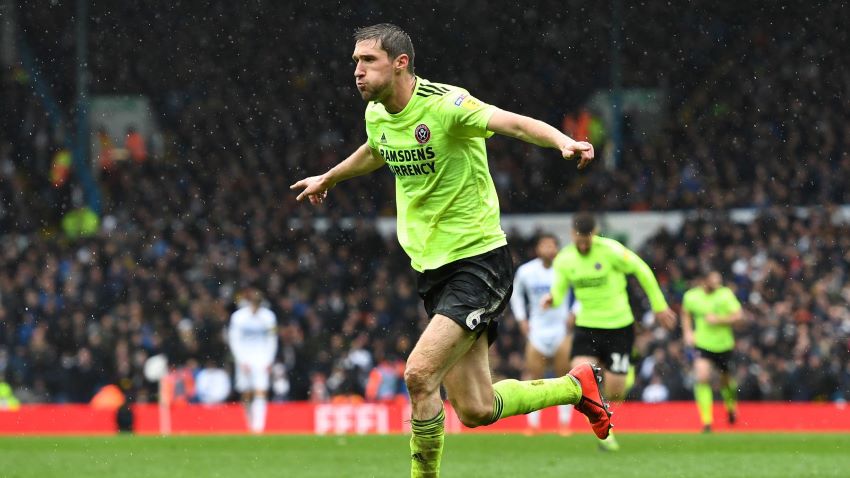 minutes.
To add to the pain, Casilla was sent off in injury-time.
minutes.
To add to the pain, Casilla was sent off in injury-time.
Leeds slipped to third but bounced back a week later to defeat Millwall
while the Blades lost at home to Bristol City. Fortunes fluctuated wildly
over the course of the final 20 minutes. After 71 minutes, Sheffield took
a 2-1 lead with Leeds losing by the same score. Ayling instantly equalised
for the Whites. 77 minutes and Weimann scored for Bristol and six minutes
later Hernandez won the game for Leeds just as Weimann completed his hat
trick to finish off Sheffield. It was almost more than nerves could bear.
With seven games to go, Norwich had pulled well clear at the top and
Leeds had a two-point advantage over Sheffield United. Surely, Bielsa's
men had enough in the tank to see out the job?
Never say such a thing to a Leeds United fan!
On 6 April, Norwich rubbed in their superiority by beating QPR 4-0, and
it was suddenly advantage Sheffield United as they won at Preston while
Leeds stumbled to defeat at Birmingham.
Three days later, and another twist with Leeds winning 2-0 at Preston
and Sheffield held to a draw at Birmingham. Five games to go and Leeds
ahead by a point as the tension grew.
Sheffield United gave Leeds more encouragement when they could only draw
at home to Millwall in the lunchtime kick off on 13 April. Bielsa's men
capitalised when Jack Harrison scored the only goal of the game with Sheffield
Wednesday.
Three points clear of the Blades, Leeds now needed ten points from their
remaining four games to confirm promotion.
Just as the finishing line came into sight, something got hold of the
United players.
On 19 April they had a 'gimme' at home to relegation-threatened Wigan.
They had seen Sheffield escape with a victory from a testing game at home
to Nottingham Forest, but they started as if they were going to romp home
against the Latics.
Things looked good after 14 minutes when Wigan centre-back Cedric Kipre
was dismissed for handling on the line. Hernandez rapped his spot kick
against the post, but three minutes later Bamford latched onto a through
ball and hammered home confidently.
Leeds threatened to run riot but they let Wigan back into the contest
and Gavin Massey shot past Casilla to equalise just before the break.
17 minutes into the second half, the same player headed Wigan ahead and
they withstood everything an anxious Leeds side could throw at them and
secured a shock victory.
'Destiny gave us a red card, a penalty and 15 chances to score,' said
a mortified Bielsa. 'We simply should have won that game today. I am sad
at this defeat, but I am very motivated. We have had a good season, but
it will mean nothing if we do not get promoted … This is a very serious
wound in the worst moment.'
back to top
It was a day to forget, but it was almost impossible for Leeds supporters
to do so. They could almost hear the strains of 'Leeds, Leeds are falling
apart — AGAIN' at rivals' stadia all across the country.
It made the trip to Brentford a must win, but Leeds' record against the
Bees at Griffin Park was dismal. They had not won at the ground since
August 1950 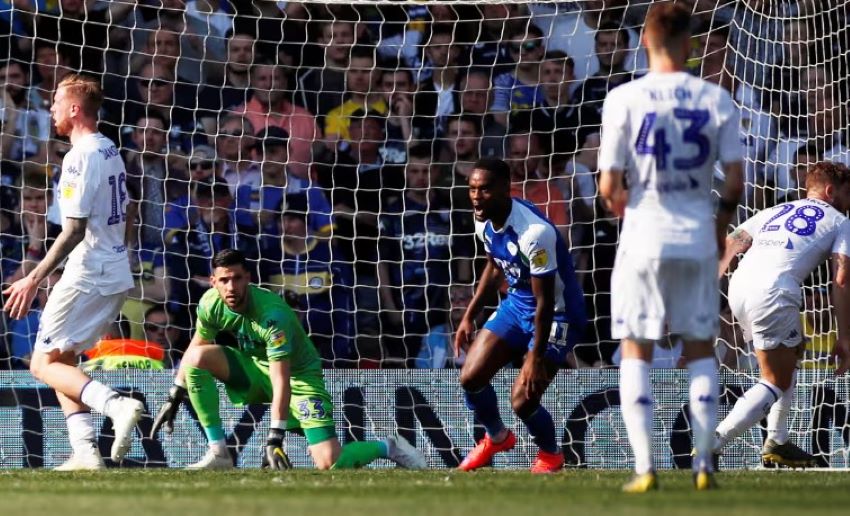 and
when Sheffield United ran out easy lunchtime winners at Hull, the task
became monumental.
and
when Sheffield United ran out easy lunchtime winners at Hull, the task
became monumental.
Bielsa recalled Cooper and Forshaw in place of Berardi and Phillips and
Leeds dominated the early stages with Bamford firing wide from inside
the area. Leeds were furious when they were inexplicably denied a penalty
after Julian Jeanvier swept Bamford's legs from under him. Referee Keith
Stroud shrugged off the appeals but it was an obvious injustice.
Brentford took the lead on the stroke of half-time after Sergi Canos
played Neil Maupay in on goal.
Leeds had the early chances in the second half but Canos was in inspired
form and doubled Brentford's lead after 62 minutes, flicking the ball
past Casilla. Maupay nearly made it three two minutes later but skied
an acrobatic effort.
The body language of Bielsa and the players told the story at the end.
Hernandez left the field in tears and the coach admitted his side's automatic
promotion chances looked slim. The Argentine shook every one of his players'
hands at the end 'because we all saw that our possibility to finish first
and second were decreasing … and the players felt that too. I thought
they deserved that for all the effort they made.'
Sheffield United virtually wrapped things up the following Saturday by
beating Ipswich. They had a six-point lead and a goal difference superiority
of 13.
It made Leeds' game on the Sunday against Aston Villa, the division's
form side, a dead rubber but somehow United found the resilience to dominate.
The afternoon would be remembered, however, for a controversial five-minute
spell as the game moved into its final quarter.
All afternoon, Villa had infuriated the Leeds fans with their outrageous
diving and when Cooper left Jonathan Kotja sprawling with a heavy tackle,
there were only cheers round Elland Road. As the ball fell to Roberts,
several Villa players pulled up, expecting him to put it out to allow
treatment.
Roberts passed down the line to Klich, who later claimed he hadn't seen
the incident, and went on to score, provoking mayhem. The Villa players
were incensed and manhandled Klich disgracefully; Bamford appeared to
go down injured, claiming he had been punched and Anwar El Ghazi was shown
the red card. Villa boss Dean Smith and assistant John Terry stridently
confronted Bielsa 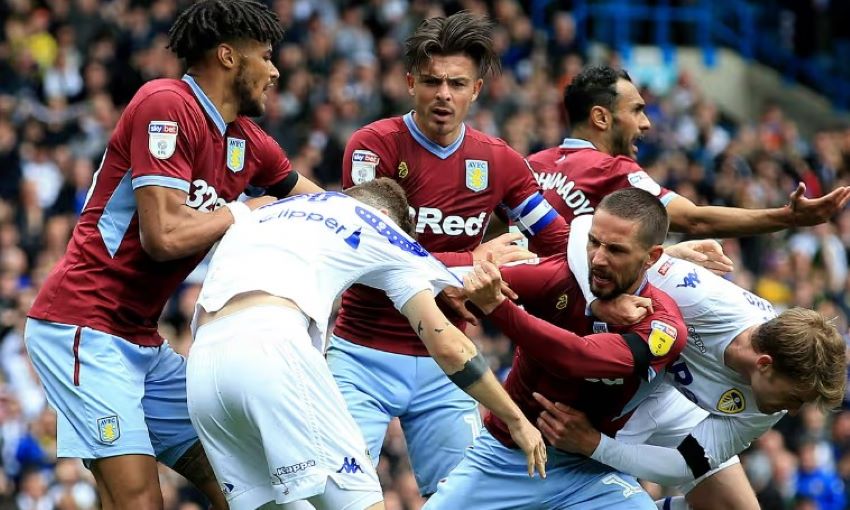 and
his coaching staff and matters threatened to get out of hand.
and
his coaching staff and matters threatened to get out of hand.
The game resumed after a stoppage of five minutes with Bielsa directing
his players to allow Villa to score. Jansson was unsympathetic and attempted
a tackle, but his teammates obeyed Bielsa's instructions and Albert Adomah
walked in the equaliser.
Bielsa was lauded afterwards for his sportsmanship, but merely said,
'We just gave the goal back. Everyone saw the facts. We expressed our
interpretation of the facts by doing what we did. English football is
known for this [sportsmanship].'
Bamford was given a retrospective two-match suspension for attempting
to deceive an official and El Ghazi's red card was rescinded.
Leeds lost their final game against Ipswich, but the result was irrelevant
with all eyes on the lottery of the play-offs and a resumption of the
season-long feud with Frank Lampard and Derby County.
It appeared that Leeds had done the hardest part of the job at Pride
Park after Roofe's 15 goal of the season earned first-leg victory.
back to top
Derby were incensed when assistant referee Eddie Smart persuaded referee
Craig Pawson to overturn his award of a penalty to the Rams with 14 minutes
to go — Harrison had been adjudged to have fouled Jayden Bogle.
The home side also felt Klich should have been dismissed for a butt to
Fikayo Tomori's chest as he rose to his feet after going down under a
challenge. He was given a yellow card over the incident.
The match served merely as an appetiser for the game of the season as
Bielsa and Lampard locked horns again at Elland Road on 15 May.
It was an emotion-filled evening at Elland Road with the Leeds fans in
fine voice. Bamford returned to replace the injured Roofe while Bielsa
left the fit again Jansson on the bench.
It was a feisty encounter from the first whistle — Leeds fans took
a particular dislike to Derby captain Richard Keogh who threw his considerable
bulk about without incurring the wrath of referee Anthony Taylor.
Leeds were on the front foot early doors and after 24 minutes, Dallas
pounced when Cooper's header came back off the post. He slammed the ball
home to give his side a two-goal aggregate lead. The roar echoed into
the night sky as Leeds took a massive step towards the Wembley final.
They were playing well if not quite at their best, but Lampard shook
things up, bringing Jack Marriott off the bench a minute before the break.
He had an 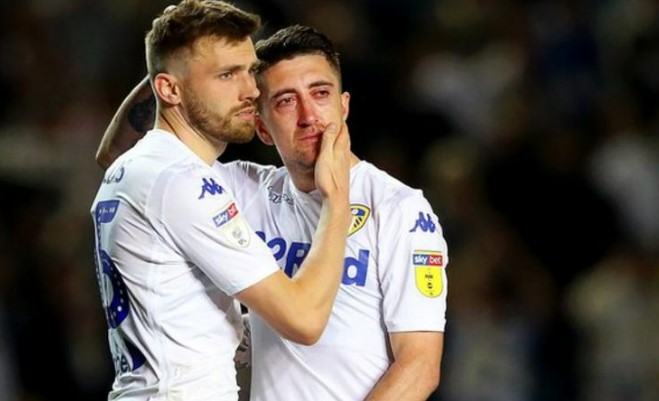 instant
impact and when Casilla came racing out to deal with a situation that
Cooper seemed to have under control, the two Leeds men got in each other's
way and the ball ran clear for Marriott to poke home.
instant
impact and when Casilla came racing out to deal with a situation that
Cooper seemed to have under control, the two Leeds men got in each other's
way and the ball ran clear for Marriott to poke home.
Leeds came out after the break ready to snatch back the momentum but
they never got the chance. A minute in, Chelsea loanee Mason Mount put
Derby ahead on the night.
Just before the hour, Cooper was adjudged to have pulled Mason Bennett's
shirt in the area and the referee awarded Derby a penalty. Liverpool loanee
Harry Wilson made no mistake from the spot and suddenly the Rams were
ahead.
Within four minutes, the aggregate scores were level when Dallas scored
his second, cutting in from the left to fire home spectacularly.
Such moments often spark a fightback and certainly Leeds had the best
of the next ten, but they lost their way when Berardi was sent off after
78 minutes for retaliating after several heavy challenges. Seven minutes
later and Marriott poked Derby ahead.
Rams defender Scott Malone was dismissed for a second yellow in injury-time,
but Leeds were beaten, sentenced to a tenth successive season in the Championship.
Tears were shed all around Elland Road and Bielsa summed up a sad evening
afterwards. 'It's a painful situation and I'm disappointed. We should
have had one or two more in the first half and then the second half broke
immediately. We lost control. We had twenty minutes without control and
I couldn't find a solution.'
His voice trailed away wistfully as he gazed into the far distance. On
that devastating evening, no one knew whether Marcelo Bielsa would be
back to try again.
Results, table and transfers
back to top













 I
have always felt it was important to wait for the right project to come
along … when a club with Leeds United's history made me an offer, it was
impossible to turn down.'
I
have always felt it was important to wait for the right project to come
along … when a club with Leeds United's history made me an offer, it was
impossible to turn down.' Bamford.
Bamford. got
the show on the road again and Leeds blossomed in the sunshine, making
the Canaries look inept in a 3-0 hammering that was over long before Hernandez
wrapped things up with the third goal after 67 minutes.
got
the show on the road again and Leeds blossomed in the sunshine, making
the Canaries look inept in a 3-0 hammering that was over long before Hernandez
wrapped things up with the third goal after 67 minutes. Sheffield
United and West Bromwich Albion were closing fast. Exit from the FA Cup
at QPR was irrelevant given the second string nature of Bielsa's selection
but a chance to restore some confidence was lost.
Sheffield
United and West Bromwich Albion were closing fast. Exit from the FA Cup
at QPR was irrelevant given the second string nature of Bielsa's selection
but a chance to restore some confidence was lost. away
from the club. Not a bit of it, as the Argentine delivered an elaborate
presentation to demonstrate that surveillance was merely the cherry on
the cake of the vast preparation that he lavished on every game.
away
from the club. Not a bit of it, as the Argentine delivered an elaborate
presentation to demonstrate that surveillance was merely the cherry on
the cake of the vast preparation that he lavished on every game. minutes.
To add to the pain, Casilla was sent off in injury-time.
minutes.
To add to the pain, Casilla was sent off in injury-time. and
when Sheffield United ran out easy lunchtime winners at Hull, the task
became monumental.
and
when Sheffield United ran out easy lunchtime winners at Hull, the task
became monumental. and
his coaching staff and matters threatened to get out of hand.
and
his coaching staff and matters threatened to get out of hand. instant
impact and when Casilla came racing out to deal with a situation that
Cooper seemed to have under control, the two Leeds men got in each other's
way and the ball ran clear for Marriott to poke home.
instant
impact and when Casilla came racing out to deal with a situation that
Cooper seemed to have under control, the two Leeds men got in each other's
way and the ball ran clear for Marriott to poke home.